Understanding Western Union Services at Kroger
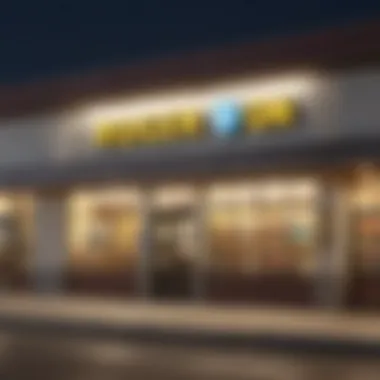
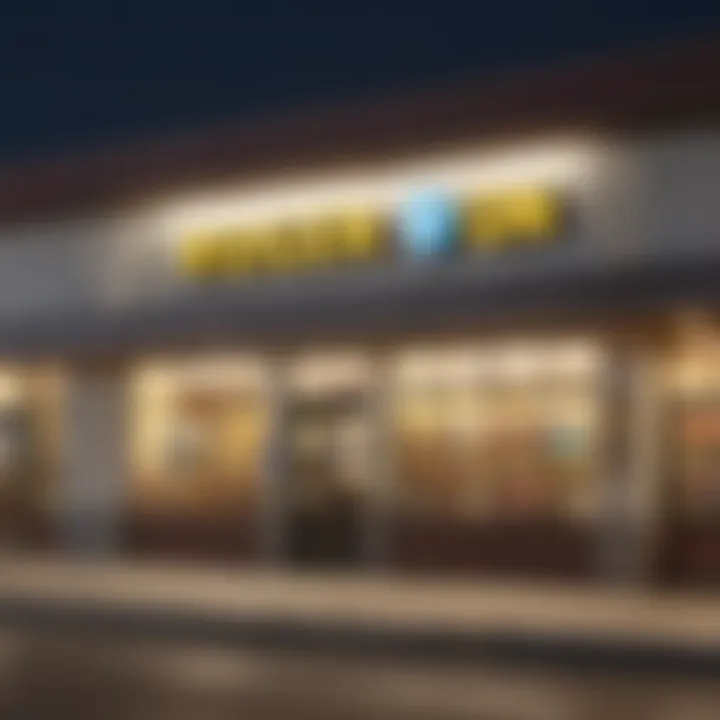
Intro
In today's fast-paced world, convenience is a top priority for consumers. The integration of Western Union services into Kroger locations provides an essential resource for individuals looking to manage their finances with ease. This article aims to explore the operational framework, services offered, and implications of using Western Union in a grocery store setting. Customers visiting Kroger can access a wide range of financial services right alongside their grocery shopping, enhancing the overall shopping experience and simplifying their financial transactions.
As we delve into the details, we will examine how these services work, the variety of options available, and the impact on the user experience. By understanding these aspects, readers will gain insight into how to utilize Western Union’s offerings effectively, turning routine errands into opportunities for convenient financial transactions.
Preface to Western Union
Understanding Western Union is essential in today’s fast-paced financial world. The organization plays a significant role in facilitating global money transfers, offering essential services to millions around the globe. With many customers seeking ease in transaction processes, the partnership between Kroger and Western Union presents a unique opportunity for consumers to access vital financial services in a familiar environment. This initiative simplifies tasks like sending money to family, making bill payments, and obtaining money orders, all under one roof.
By examining this integration, we gain insight into how grocery stores can transform into vital financial hubs, effectively bridging retail and banking. There are important elements to consider, including convenience, accessibility, and customer trust. This paper will explore these aspects, providing a comprehensive look at how Western Union operates within Kroger locations.
Overview of Western Union Services
Western Union offers an array of services designed to meet the needs of diverse consumers. Major service categories include:
- Money Transfers: This is perhaps the most recognizable offering. Customers can send funds both domestically and internationally, sustaining family connections and business dealings.
- Bill Payments: Users can pay various bills at one location, which reduces the time spent managing finances.
- Money Orders: Reliable and secure, money orders serve as a safe payment method, especially for those who may not have access to traditional banking.
Each service has nuances making it appealing to specific groups. Familiarity with these offerings allows for a more efficient and effective financial strategy.
History and Evolution of Western Union
Founded in 1851, Western Union has seen a transformative journey from telegraphy to being a global leader in money transfer services. Originally, the company primarily facilitated long-distance communications. The shift towards financial services began in the 20th century, adapting to market needs. Automation and digital technologies helped solidify its reputation, enabling faster transactions with lower risks.
Western Union's history reflects broader economic trends and technological advancements. Today, it operates in over 200 countries, demonstrating its global reach and adaptability. The company's evolution also highlights the importance of trust and reliability, which are crucial in the financial service industry. Understanding this history provides context to its current offerings and their integration at Kroger.
Kroger's Role in Financial Services
Kroger has positioned itself as a vital player in the financial services landscape. This role extends beyond traditional grocery operations. The ability to provide financial services such as money transfers, bill payments, and money orders adds significant value to Kroger's offering. In today’s fast-paced environment, consumers often seek convenience in their daily activities. By integrating financial transactions into grocery shopping, Kroger enhances the overall shopping experience.
The importance of Kroger's role lies in its accessibility. With numerous locations nationwide, Kroger has created a space where customers can handle finances alongside everyday purchases. This integration can lead to increased customer loyalty since shoppers appreciate the ability to manage their financial needs easily.
Additionally, Kroger's business model adapts to consumer needs. As more people prioritize convenience, the grocery store chain evolves its services to include financial solutions. This strategy broadens its appeal to various customer segments, including those who may not have access to banking institutions or prefer alternatives that offer more flexibility.
Kroger's Business Model
The business model of Kroger focuses on delivering value through a combination of services that meet diverse consumer demands. Kroger operates as a supermarket chain, but its approach is much more comprehensive. It offers not just groceries but also pharmacy services, fuel centers, and now, financial services. This multi-faceted model creates a one-stop shopping environment that attracts more customers.
Factors driving Kroger's business model include:
- Customer Convenience: Offering a wide range of services helps customers save time.
- Revenue Diversification: By adding financial services, Kroger increases its revenue sources, reducing over-dependence on grocery sales.
- Technological Integration: Kroger makes effective use of technology to streamline transactions, making it easier for customers to conduct business in-store.
This strategy reflects an understanding of modern consumer behavior, where convenience and efficiency are paramount. By implementing this model, Kroger not only boosts profitability but also establishes a closer relationship with its customers.
Partnership with Western Union
The collaboration between Kroger and Western Union is a significant aspect of Kroger's financial services. Western Union brings its extensive expertise in payment services and money transfers, complementing Kroger's robust retail presence. This partnership enables Kroger to offer diverse financial services that cater to a wider audience.
There are several benefits to this partnership:
- Broader Service Range: Customers can access Western Union services easily within Kroger stores, making money transfers and bill payments straightforward.
- Increased Foot Traffic: By offering these services, Kroger attracts not only regular grocery shoppers but also those specifically looking for convenient financial services.
- Trust in Established Brands: Western Union's long-standing reputation enhances consumer confidence in Kroger's financial offerings.
Services Offered by Western Union at Kroger
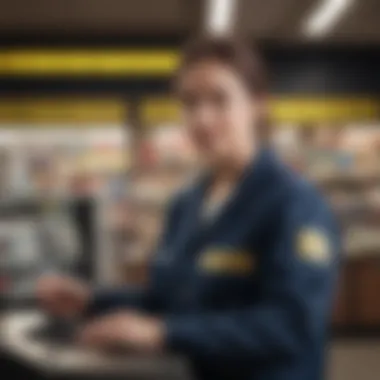

The integration of Western Union services at Kroger provides a unique opportunity for customers to manage their financial transactions conveniently within their regular shopping routine. It is essential to understand the specific services available, how they operate, and the benefits associated with using these services in a grocery store setting. This section will dive into the three primary services: Money Transfers, Bill Payments, and Money Orders.
Money Transfers
Money transfers are perhaps the most well-known service offered by Western Union. This allows individuals to send money to friends or family both domestically and internationally. The process is straightforward and enables quick access to funds.
To initiate a transfer at Kroger, customers can approach the service desk. They will need to provide details such as the recipient's name, location, and the amount being sent. Options for sending money include cash payments or debit card transactions. This flexibility caters to a variety of customer preferences.
Furthermore, this service is invaluable for those who may not have traditional banking services. It offers a way for unbanked individuals to send money safely and effectively.
Bill Payments
Bill payment services enhance the user experience by allowing customers to pay utility bills, loans, and other recurring expenses right at the store. Kroger's partnership with Western Union provides a platform for making these payments in a familiar environment, thus promoting convenience.
Customers only need their bill statement and payment method. Payments are processed quickly, often providing a confirmation receipt for peace of mind. With this service, individuals can avoid late fees and experience better control over their financial obligations.
It also allows for impulse payments—if customers realize they need to settle a bill while shopping, they can act immediately without a separate trip to a payment center.
Money Orders
Finally, Western Union at Kroger facilitates the purchase of money orders. Money orders are widely accepted as a form of payment and can be a secure alternative to cash or personal checks, which may not always be accepted.
To acquire a money order, customers go to the service desk, specify the amount, and provide funds for the purchase. A fee is typically associated with buying a money order, but it’s considered secure for transactions where personal checks might pose risks.
This service is particularly useful for those who need to make payments but prefer not to use their traditional bank accounts.
Benefits of Using Western Union at Kroger
In recent years, the integration of Western Union services at Kroger has transformed the shopping experience for customers. This section focuses on the tangible benefits provided by these services, emphasizing why they are important in enhancing customer convenience and satisfaction.
Convenience and Accessibility
Western Union services at Kroger offer a significant level of convenience. Customers can conduct various financial transactions while doing their regular grocery shopping. This saves time and reduces the need to make separate trips to a money transfer outlet.
Kroger's widespread locations make these services easily accessible to many. This is particularly beneficial for those who may not have easy access to banks or other financial institutions in their communities. It creates an opportunity for customers to manage their financial needs in a familiar setting without added stress. Being able to send or receive money directly in-store allows for quick and effective financial management, meeting immediate needs effortlessly.
Integrated Shopping and Financial Services
The collaboration between Western Union and Kroger brings together shopping and financial services under one roof. This integration is essential for creating a streamlined experience. Instead of running errands at multiple locations, customers can combine their grocery shopping with financial transactions.
By offering services like money transfers, bill payments, and money orders in the same location, Kroger enhances efficiency. This not only saves time but also helps customers who prefer to keep all their necessary tasks within a single outing. It makes financial transactions less of a chore and more of a routine part of shopping.
Customer Support and Assistance
Customer support is a critical element of the Western Union services at Kroger. Staff are trained to assist customers with their transactions, ensuring that any questions or concerns can be addressed on the spot. Customers can feel more at ease knowing there are knowledgeable individuals to support them during their transactions, especially when using financial services within a grocery store setting.
Additionally, Kroger often integrates resources to educate customers on how to navigate these services effectively. Whether it involves providing clear instructions or guidance on transaction processes, this support fortifies the overall user experience.
"Effective customer support not only alleviates worries but also empowers customers to take control of their financial transactions."
In summary, the benefits of using Western Union at Kroger center around convenience, blended shopping and financial services, and robust customer support. These elements work collectively to enhance the customer experience and promote greater financial accessibility.
User Experience: Transaction Process at Kroger
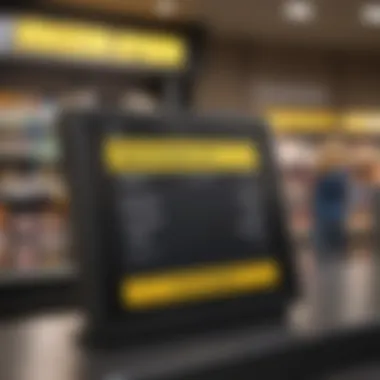
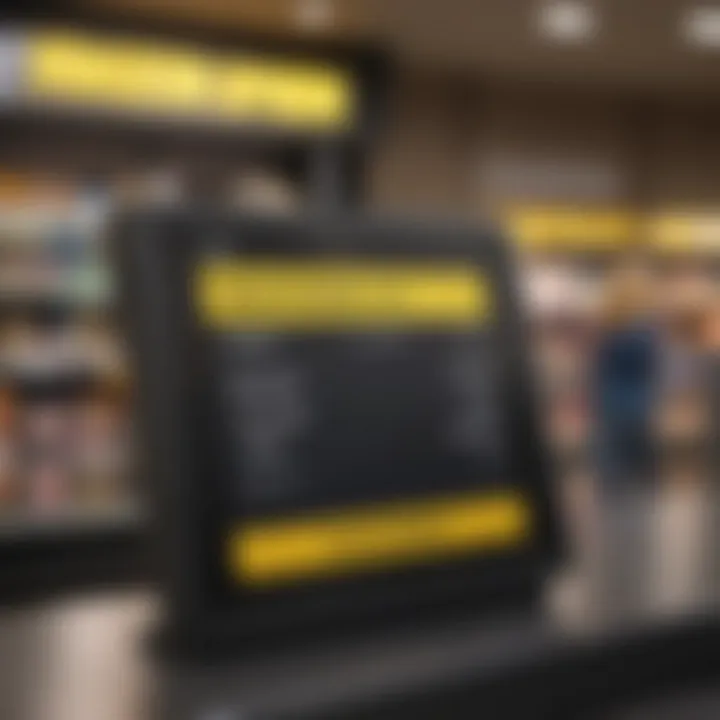
User experience is fundamental when it comes to understanding the transaction process of Western Union at Kroger. Customers expect a seamless and efficient experience when engaging with financial services. This section focuses on several key elements: simplicity, transparency, and speed. These are crucial for customers who may be new to using these types of services in a grocery setting.
At Kroger, the integration of Western Union aims to simplify money management for customers. Quick access to money transfers, bill payments, and money orders are integrated into the shopping environment. This blend of groceries and financial services means customers can manage their time effectively. They can do their shopping and handle their financial transactions in one location.
Initiating a Transaction
To initiate a transaction with Western Union at Kroger, customers typically approach the designated service counter or kiosk. The process is designed to be user-friendly. Customers must provide necessary identification, such as a government-issued ID, and details regarding the transaction. This could include the amount of money they wish to send or pay.
Financial literacy plays a role here; customers should be aware of the requirements. Understanding what documentation is needed can help streamline the process. For those who may feel nervous about financial transactions, friendly staff members assist in clarifying any questions.
Completing Payment Transactions
Once the transaction is initiated, completing payment is straightforward. Depending on the type of service, customers may pay in cash or via card. This flexibility is essential as it caters to different preferences. After the customer makes the payment, a receipt is generated. This receipt serves as proof of the transaction, which is crucial for record-keeping and for future reference.
The transparent nature of this process builds trust among users. They know exactly how much they are spending, and they have clear evidence of the transaction. Such transparency can increase users' comfort levels, making them more likely to return for future transactions.
Receiving Money Transfers
Receiving money transfers through Western Union at Kroger is designed to be efficient. After the sender processes the transfer, the recipient can go to any participating Kroger location to collect funds.
Upon arrival, the recipient will need to present a valid ID and, sometimes, the transaction number provided by the sender. This process ensures safety by confirming identity before dispensation. Once verified, the recipient receives the funds, often in cash.
Quick disbursement is vital for customers, as many people rely on these services in emergencies. Overall, Kroger’s ability to facilitate such transactions makes it a valuable resource.
Understanding the full user experience from start to finish is imperative for customer satisfaction.
Fees and Charges Associated with Transactions
Understanding the fees and charges associated with Western Union services at Kroger is crucial for customers looking to make informed financial decisions. Transparent pricing can significantly impact a user's choice about how to send money, pay bills, or purchase money orders. Grasping these costs allows users to maximize value and minimize unexpected expenses during transactions. Furthermore, awareness of associated fees can influence a customer's overall experience with financial services offered in a grocery store setting.
Understanding Transaction Fees
Transaction fees can vary based on several factors, including the type of service used, the amount of money involved, and the method of payment. For example, sending cash using Western Union's money transfer service can incur higher fees compared to electronic transfers. While Kroger cannot alter Western Union's pricing structure, they often display fees clearly during the transaction, making them easy to understand for customers.
It's also important to consider that fees may differ for domestic transfers versus international ones. When sending money abroad, additional costs for currency conversion and potential service fees may apply. This layered pricing structure underscores the necessity for users to familiarize themselves with the fee breakdown before proceeding with any transaction. For those wanting to examine specific fee schedules, Western Union’s official website provides detailed information. This can help customers gauge the cost relative to the convenience and speed of the service.
Comparative Analysis of Alternatives
When evaluating Western Union’s services at Kroger, it is wise to consider alternative financial options. Several competitors, such as MoneyGram and PayPal, also offer money transfer services, but their fee structures could be markedly different. Some may charge flat fees, while others use a percentage-based model that scales with transfer amounts.
In comparison:
- MoneyGram typically charges fees similar to Western Union but may offer more competitive rates for certain transfers, particularly online.
- PayPal allows users to send money electronically, often with lower fees associated with bank transfers, but charges for instant transfers.
Furthermore, credit unions and local banks might provide money order services at a lower cost compared to retail outlets like Kroger. Despite the convenience of using Western Union at Kroger, options such as bank transfers or the use of fintech applications can offer cost savings and more transparency.
By weighing these alternatives against Western Union's services, customers can make well-informed choices that align with their financial needs and preferences. Understanding the fees and evaluating different services equips users with the knowledge required to navigate this landscape effectively.
Security and Compliance in Financial Transactions
In the context of Western Union services at Kroger, security and compliance are paramount. Customers need to feel confident that their financial transactions are safeguarded against fraud and unauthorized access. The integration of financial services in grocery stores brings about new challenges for securing sensitive information. Understanding the safety protocols and regulatory measures in place can empower users to manage their money with assurance.
Safety Measures in Place


Western Union employs a variety of safety measures to protect customers engaging in transactions at Kroger. Some of these include:
- Encryption Technology: Sensitive data during transfers is encrypted to prevent access by malicious parties.
- Fraud Detection Systems: Advanced algorithms identify unusual activity in real time, providing alerts if something seems off.
- Employee Training: Kroger staff are trained to recognize signs of fraud and suspicious behavior. They can help ensure a secure environment for all transactions.
- Customer Verification: Users are required to provide valid identification to complete a transaction, ensuring only authorized individuals can initiate transfers.
These measures contribute significantly to maintaining the integrity of financial transactions, affirming customers' trust in both Western Union and Kroger.
Regulatory Standards and Guidelines
It is critical for Western Union and Kroger to comply with financial regulations to ensure safe operations.
Regulatory standards provide essential frameworks regarding:
- Know Your Customer (KYC): This policy mandates verifying the identity of clients to prevent money laundering and other illegal activities.
- Anti-Money Laundering (AML): Compliance with AML regulations helps to monitor and report suspicious transactions to the authorities.
- Consumer Protection Laws: These laws protect customers from fraud and deceptive practices, ensuring transparency in fees and services offered.
Compliance with these regulatory requirements enhances the credibility of financial services at Kroger. As a result, customers can rest assured that Western Union services are reliable and legally sound.
"Regulatory compliance is not just about adhering to the law; it is about fostering trust and confidence in financial systems."
In summary, security and compliance are fundamental components of Western Union services at Kroger. They work to create a safer shopping experience, allowing customers to focus on their transactions rather than their risks. Understanding these aspects can facilitate better financial decisions for users.
Challenges and Limitations of the Service
The integration of Western Union services at Kroger presents both advantages and hurdles for users. It is essential to explore these challenges and limitations so users can develop realistic expectations. Understanding these aspects helps customers navigate the financial transactions better, ensuring they utilize the services effectively.
Common Challenges Faced by Users
Users often encounter various challenges while using Western Union services at Kroger. Some of the most prevalent issues include:
- Availability of Services: Not every Kroger location offers all the Western Union services. Customers may find their local store lacks certain options, such as money transfers or bill payments, which can lead to frustration.
- Service Hours: The operational hours of Western Union within Kroger stores may differ from the grocery store's regular hours. This discrepancy can create confusion and limit when users can access these services.
- User Experience: The physical environment of a grocery store may not be conducive to financial transactions. Factors like long lines or distractions in the store can impact the efficiency and comfort of using these services.
- Technological Issues: Problems with the technology used for transactions can also arise. System downtimes or errors during processing can delay transactions and cause uncertainty for users.
Limitations in the Service Offerings
While the partnership between Kroger and Western Union is beneficial, there are notable limitations:
- Limited Payment Options: Users might find restrictions on the types of payments they can make or receive. For instance, cash payments are mostly accepted, limiting those who prefer digital payment methods or checks.
- Transfer Limits: Western Union services come with particular limits on how much can be transferred at one time. Dependency on these limitations might hinder those needing to send large amounts of money urgently.
- Currency Restrictions: International transactions may carry restrictions on which currencies can be exchanged, affecting cross-border service offerings.
- Lack of Personalized Services: Kroger staff may have limited training regarding Western Union services. This can lead to inadequate assistance or guidance for users unfamiliar with the process.
"Understanding the potential hurdles of using Western Union services at Kroger can prepare customers for a smoother transaction experience."
Ending and Future Trends
In the realm of financial services, the partnership between Western Union and Kroger stands out for its commitment to bringing convenience to everyday transactions. As this article has explored, the integration of Western Union services at Kroger enhances the shopping experience while fulfilling various financial needs. Understanding these services is crucial because they represent a shift in how consumers interact with financial institutions in familiar environments.
The benefits of using Western Union at Kroger are significant. Customers enjoy easy access to money transfers, bill payments, and money orders without having to navigate to a separate financial institution. This ease of access fosters a more seamless shopping experience, allowing individuals to manage both their grocery needs and financial transactions in one stop.
Further, the combination of a trusted grocery brand with a long-established financial services provider like Western Union imbues customers with confidence in the security and functionality of their transactions. As the retail industry evolves, such integrations become essential.
Recapping the Benefits of Using Western Union at Kroger
To summarize, the benefits of using Western Union at Kroger can be highlighted as follows:
- Convenient Transactions: Customers can handle multiple services while shopping, saving time and effort.
- Enhanced Accessibility: With many Kroger locations available to the public, using Western Union's services becomes more widespread and practical, allowing more individuals to utilize these options.
- Security Features: The collaboration ensures that customers receive reputable service with advanced security measures in place.
These advantages support the growing trend of combining retail and financial services, ultimately contributing to a more consumer-friendly approach.
Future of Financial Services in Retail Environments
Looking ahead, the future of financial services in retail environments is poised for innovation. The rise of technology and changing consumer behaviors suggests that we will see even deeper integrations between grocery stores and financial service providers.
- Digital Payment Solutions: As more consumers adopt digital wallets and mobile payments, services like Western Union may evolve to incorporate these technologies.
- Personalized Financial Services: Retailers may begin to offer tailored financial products based on buying patterns and consumer needs, enriching customer engagement.
- Expansion of Services: We could expect to see the addition of more financial services at retail locations, such as savings accounts or investment advice.
Ultimately, the potential for further collaboration suggests a promising future. This integration could define how we think about shopping and financial transactions, leading to a more holistic and efficient consumer experience.







